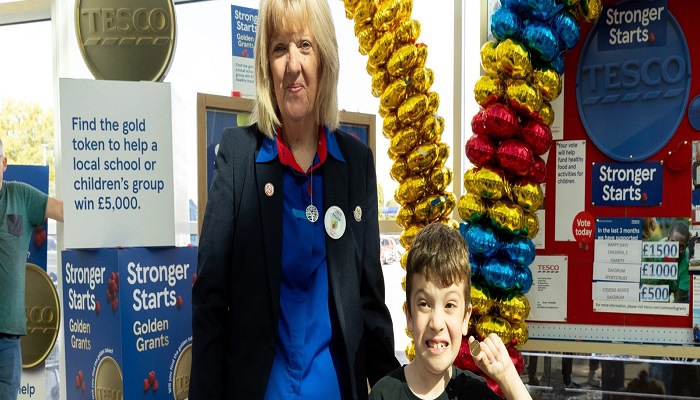Recent research reveals that the average Briton will do 5.1 ‘good deeds’ every week, totalling more than 265 over the course of the year.
Among the most common acts of kindness are holding the door open for someone (67%), checking in with someone to ensure they’re well (54%), trying to boost someone’s confidence (35%), picking up litter (23%) and donating items to a food bank (12%).
The research, commissioned by Tesco as part of its Stronger Starts Golden Grants initiative, delves much deeper into who is actually delivering these good deeds. The study indicates that inspirational figures play a significant role in motivating individuals to engage in acts of kindness. While 7% of respondents cited being inspired by a teacher, a notable 27% mentioned being influenced by a family member, highlighting the impactful role of familial support and guidance in fostering a culture of kindness within communities.
As well as looking at who is prone to doing good deeds, the study identified the potential for acts of kindness to create a ripple effect, with almost half (45%) those surveyed saying they gained more of a sense of community when witnessing someone else do a good deed and a third (33%) felt inspired to carry out their own.
Four in 5 (81%) believe that acts of kindness can motivate others to do the same and half the population (51%) believe the Covid pandemic encouraged people to be more community minded.
And while cats are often accused of being selfish, it appears cat lovers claim to be more inclined to do good deeds, doing 5.6 in the average week, compared to 4.7 among dog lovers.
However, those with siblings claimed to do more good deeds each week (5.3) than those who were an only child (4.4).
Psychologist and broadcaster, Emma Kenny says:
“Science tells us doing good deeds can have psychological benefits, strengthen social bonds, and there is even evidence to suggest it can improve physical health, potentially lowering blood pressure”.
“So it’s great to see so many claiming to regularly be dishing out acts of kindness, not only is it likely to be helping someone else, it’s also likely to be helping them.”
The research also showed that people hoping to fall on the receiving end of a good deed should not expect to get lucky during the morning commute or school run, with just 3% of the country saying they’re prone to doing good deeds before 9am. The research revealed that more than a third of the nation (37%) say they tend to do good deeds at a particular time of day, with 12.48pm the average time they’re likely to happen.
This timing aligns with Tesco’s Stronger Starts Golden Grants celebrations taking place in 100 Tesco stores nationwide on Saturday 16th March, from 12-1pm, making this the perfect time for customers to take a lucky dip to find a gold version of Tesco’s famous blue voting token and do a good deed for their local community.
Customers who find a gold token will be able to choose which of the three chosen local school or children’s groups will receive a £5,000 Golden Grant from Tesco to spend on equipment or healthy food, and help give children a stronger start in life.
Tesco Head of Communities, Claire De Silva says:
“Schools and local projects are vital in supporting our children and our communities. We’re giving customers who visit these 100 stores the chance to make a difference to a school or group that’s doing amazing work on their doorstep.”
Tesco Stronger Starts is committed to supporting more than 5,000 schools and children’s groups with £5 million in funding every year. This funding aims to provide nutritious food and resources to keep children physically active throughout the school day.
So on Saturday 16th March head to your local participating Tesco store between 12-1pm to join in the fun and make a meaningful impact to your local community, with the incredible chance of awarding a deserving local school or children’s group with a £5,000 Golden Grant.
Top 10 most common good deeds done are:
- Holding the door open for someone (67%)
- Sent someone a message just to check in on how they were (54%)
- Tried to boost someone’s confidence (35%)
- Given my knowledge freely to someone looking for advice (34%)
- Given money to charity (32%)
- Made an effort to make someone feel welcome (32%)
- Given items to charity (31%)
- Taken in a neighbour’s parcel (25%)
- Picked up litter that was not my own (23%)
- Offered to help carry something for someone who was struggling (20%)
Source: Tesco


